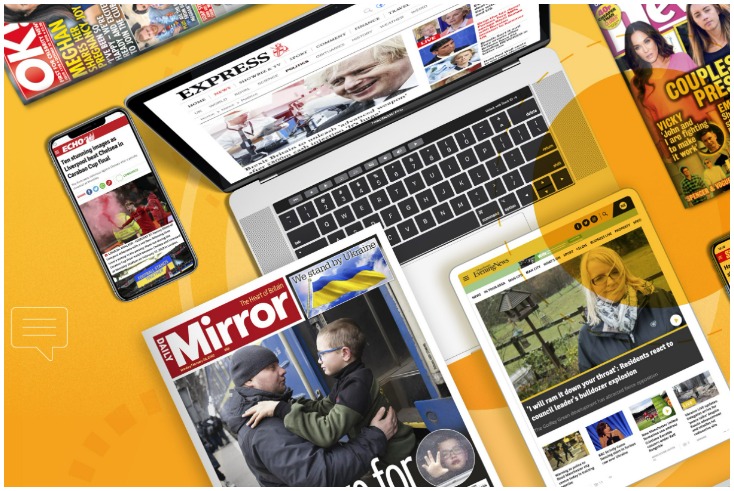Reach revenue declines 6% but stock buoyed by cost cuts plan

Daily Mirror publisher Reach revenue declined 6.1% year-on-year to £279.4, the company reported in its half-year earnings today.
Reach properties saw a 16% decline in page views year-on-year; the company attributed the lion’s share of the drop to Facebook’s move away from news prioritisation, and said that without that change, page views would only have declined 2%.
The UK’s largest publisher posted 2.4% growth in circulations, however, and noted that newsprint cost inflation was beginning to subside, though print ad revenue dropped 18.3% year-on-year.
The company also stated it is on track to deliver a 5%-6% reduction in its overall operating cost base, with most of the benefits of the cuts coming in the second half of the year. Reach also pointed to its launch of US titles as reason for optimism in its newsbrands’ audience growth going forward.
“The ongoing resilience and predictability of print underpins continued investment in a strong digital offering, with circulation revenue growing and newsprint costs starting to decline,” said CEO Jim Mullen, who pointed to a “stronger second half performance” thanks to “cost reductions on plan”. He added the company expects full-year profits this year to be in line with the current market consensus.
Shares of Reach rose over 16% in early trading Tuesday in response to the earnings results, but the share price remains down over 16% year-to-date.
Analysis: Reaching for more stable footing
Reach has had a challenging 2023 as the company, like most publishers, has needed to remain resilient amid a downturn in digital advertising and ongoing declines in print circulations and revenues.
The improvement in print circulations provides the publisher with a bit of a boost, and one could expect ad revenues to improve slightly in kind, but the company is aware of the need to continue its prioritisation toward digital revenues and cut costs to improve its bottom line.
And while blaming Facebook’s change in policy toward news for a sharp decline in page views may well be fair, it doesn’t change the fact that its outlets will need to adapt to attract online audiences and build brand loyalty.
Reach has already undergone rounds of layoffs over the past year. In January, the publisher laid off 200 staff, and Reach’s execs elected to forego salary increases in 2023 to further tamp down on costs and ostensibly take accountability for a decline in financial performance.
Improved efficiency could come from AI. The company has previously acknowledged it is testing the use of AI for article creation, and efforts remain ongoing with a proprietary AI writing assistant, Mantis Scribe.
The company is aggressively seeking to expand its footprint with new audiences. A number of Reach titles, most notably the Express and Mirror, have launched or are launching US editions this year, and the publisher is also experimenting with new social brands like Curiously, which seek to target Gen Z audiences.
While Reach is optimistic those brands will improve returns, it’s unclear whether any will see major success. Curiously is still a nascent brand and young audiences are fickle; meanwhile the US market, already saturated with conservative news amid a broader trend by British tabloids to enter into the market, could be tricky to crack.
**This article was updated after publication to reflect clarification from Reach on its cost-cutting plan. The original article described that most of the cost cutting actions would be taken in the second half of the year; Reach has stated that such cost-cutting measures have in fact already been actioned, but the benefits will be seen in H2.



